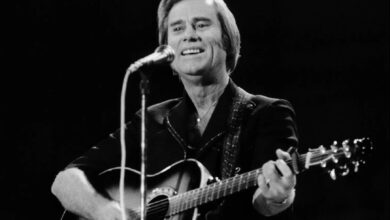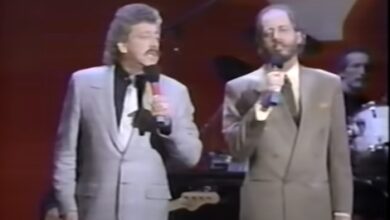Vern Gosdin’s “That Just About Does It” Becomes a Haunting Farewell That Redefined Country Heartbreak in 1984
Released in 1984, Vern Gosdin’s “That Just About Does It” stands among the most poignant and emotionally resonant country ballads of its decade. A masterclass in restraint and raw sentiment, the song didn’t just secure Gosdin’s place among the genre’s finest vocalists—it quietly redefined the very language of heartache. Though it peaked modestly at #4 on the Billboard Hot Country Singles chart, its legacy has long outlived its initial chart run, thanks to its haunting message of resignation and emotional closure. For many country fans, it remains the definitive song of goodbye—simple, stripped down, and utterly devastating.
By 1984, Vern Gosdin was already a familiar name to country audiences, often referred to as “The Voice” for his rich, aching baritone and ability to pour soul into every syllable. Born in Woodland, Alabama, Gosdin grew up singing gospel before moving into the West Coast country scene in the 1960s. He earned his first success as part of The Gosdin Brothers alongside sibling Rex. Though his early years were spent in harmony-driven duets, Vern’s solo career flourished in the 1970s and early ’80s, carving out a niche for emotionally intense ballads that channeled life’s harsher truths with honesty and grace.
“That Just About Does It” was penned by Vern Gosdin himself along with Max D. Barnes, a frequent collaborator known for his work with George Jones and Randy Travis. The story goes that the phrase itself—a quiet, stoic dismissal—came from a conversation Gosdin had during a difficult breakup. What set the song apart from the standard breakup tune was its mature take on the end of love; there is no pleading, no anger, just a deep sigh of acceptance. It captured the kind of sorrow that isn’t loud or dramatic but lingers in the silence after the last word.
The song’s production was handled with the utmost sensitivity. Instead of relying on lush orchestration, it leaned into minimalism—light steel guitar, subtle piano, and Gosdin’s world-weary vocal front and center. His phrasing was deliberate and hushed, as if every word required effort from a soul already worn down. This choice brought listeners closer, creating an almost confessional intimacy. There’s a tremble in his delivery that suggests he’s not just singing the lyrics—he’s living them.
Upon release, the song received considerable airplay on country radio and quickly climbed the charts. While it didn’t reach the number one spot, it resonated deeply with fans, particularly those who gravitated toward the traditionalist movement in country music. It held a steady presence on the charts for 14 weeks, reinforcing Gosdin’s image as one of the genre’s most emotionally authentic storytellers. Though it lacked the commercial flash of some of its contemporaries, its quiet power earned critical acclaim.
Culturally, “That Just About Does It” marked a return to stripped-down, emotionally driven storytelling in an era where country music was increasingly influenced by pop production. It reminded audiences and artists alike that the heart of country music lay in its stories of everyday pain, love, and loss. For many listeners, especially those disillusioned by glossy, radio-friendly fare, Gosdin’s single was a breath of fresh, tear-streaked air.
The success of this song led to a significant uptick in Gosdin’s popularity. He went on to release a string of emotionally potent tracks throughout the 1980s, including “Set ’Em Up Joe” and “Chiseled in Stone,” the latter winning the CMA Song of the Year in 1989. “That Just About Does It” helped frame his public image not just as a great singer, but as country music’s poet of heartbreak. It opened doors to more intimate performances and a devoted fanbase that followed him through every sorrowful turn.
The track’s influence extended well beyond Gosdin’s own catalog. Its minimalist approach and emotionally raw lyrics inspired a new wave of neo-traditionalist artists in the late ’80s and early ’90s—performers like Alan Jackson, Randy Travis, and George Strait, who would all credit Vern Gosdin as a key influence. You can hear echoes of “That Just About Does It” in countless slow-burning ballads that prioritize emotional depth over commercial appeal.
Several artists paid homage to Gosdin by covering this track in the years that followed. Most notably, fellow traditionalist Gene Watson delivered a moving version in his 2001 tribute album. Though no rendition has matched the trembling finality of Gosdin’s original, each one confirmed the song’s reputation as a modern country standard—one of those rare tracks where silence speaks louder than sound.
Around the time of the song’s release, Gosdin was experiencing personal turmoil. A divorce and the pressures of the road left him emotionally exhausted. The song, in many ways, mirrored his life at the time, blurring the line between performance and confession. Listeners weren’t just connecting with a story—they were bearing witness to Gosdin’s own journey through grief and detachment.
Today, “That Just About Does It” enjoys a second life through streaming platforms, classic country radio, and countless playlist tributes to lost love. It has remained a staple at funerals, end-of-year retrospectives, and heartache-themed country compilations. Its endurance lies in its simplicity—just a man, his voice, and a line that says everything by saying so little.
Looking back, this song stands as a turning point in country music’s evolution. It reminded an entire industry of the value of quiet sincerity in a genre that too often favors bombast. It helped usher in an era of renewed appreciation for traditional sounds and emotional authenticity, paving the way for future generations to embrace sorrow as a legitimate form of artistic expression.
Though Gosdin passed away in 2009, “That Just About Does It” remains a centerpiece of his legacy. His influence can be heard in the works of countless younger artists who still mine the depths of loss and longing with trembling hands and honest voices. In a world of fleeting trends, this song has become a fixed star—unmoving, undeniable, unforgettable.
Ultimately, what makes “That Just About Does It” so timeless is its ability to articulate the moment we all dread—the final farewell, spoken softly but felt deeply. It’s not just a country song. It’s a universal expression of letting go, rendered in a voice that never needed to shout to be heard.



